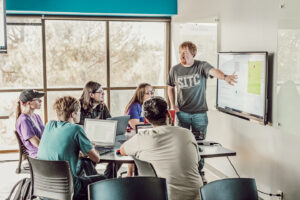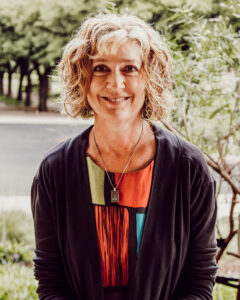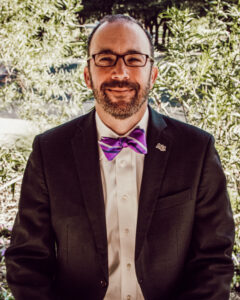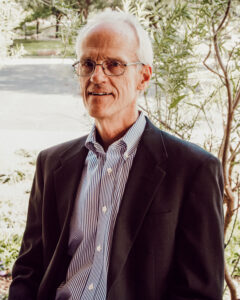
Pre-COVID-19: Dr. James Prather with SITC students
COVID-19 has brought changes and challenges all across the country, including the ACU campus. From the middle of the spring semester to the current fall semester, our faculty have continuously adjusted how they deliver their class material and how to interact with their students. We interviewed Dr. Laura Phillips (’88), associate professor of management, Clint Buck, assistant dean and instructor of accounting, and Dr. Don Pope, associate professor of management to hear about their experiences teaching during the pandemic and how they are working to overcome the challenges that it has presented.
What challenges has COVID-19 brought to the classroom?
Phillips: “My challenges were in the spring and Maymester terms. In the spring I was teaching two semesters of stats that were supposed to start the week after spring break. When we took that extra week off to regroup, I lost 14% of my semester. Also, since we’d never met in person, I didn’t know any of the students and we had not been able to create a class culture before shifting to online. My other class was supposed to be a one-week Maymester in Dallas with about 20 guest speakers and several field trips. That class went virtual as well, which was a huge shift.”
Buck: “FACE MASKS! While I understand the need for face masks, they pose a great challenge in the classroom. It’s hard to ‘read’ the classroom and see if concepts are making sense, if jokes are landing, etc., and it is also hard to teach while wearing a mask. Seeing people’s faces, sending and receiving smiles, and shaking hands are all actions relied upon in the past to establish and nurture connection and community – hallmarks of the COBA and ACU experience. The current realities are forcing us to rethink how we establish and nurture our community, which is very challenging.”
Pope: “The inability to talk with and help students face to face, along with reduced interaction with faculty and staff colleagues.”

Dr. Laura Philips
What did you do to overcome those challenges?
Phillips: “Lots of trial and error! We’d try some things for a week in stats, and if it wasn’t working, we’d make adjustments for the next week. My coworkers were all very supportive but since we were working remotely and everyone was scrambling, there wasn’t a lot of time to sit around and think philosophically about how we should approach our classes. My schedule didn’t always allow me to attend but the weekly COBA Zoom prayer times have been great! And throughout the summer, the staff in the Adams Center and the crew they assembled to provide resources and training for the faculty have been outstanding.”
Buck: “My teaching colleagues have been invaluable in navigating these issues, and they have also been helpful in the tactical aspects of the job (great suggestions for teaching online and in a distanced classroom, things to look for, things to avoid, etc.). My administrative colleagues have been very good to normalize the challenges we face. It is not easy to be a good employee, a good spouse, and a good parent while navigating a global pandemic, and I am grateful for their faithful demonstration of grace throughout this season.”
Pope: “Through the use of technology tools – online teaching in Canvas and Zoom, we carry on and push through. I would like to compliment the IT people in the background here who work tirelessly ‘below the radar’ and receive little thanks. I would also like to thank the educational technology support staff in the Adams Center and the Library. They are amazing.”

Clint Buck
What’s different about the current fall semester?
Phillips: “I can’t really address this question because I’m teaching online this semester. I am taking German, so I’ve experienced the classroom as a student, but not as a professor.”
Buck: “Can’t shake hands or see smiles; can’t see if a concept or idea is resonating or not. Things I took for granted – like handing out printed material in class! – are very noticeable in their absence. Also, I used to enjoy having a very special teaching assistant in class at least once each semester, but my eight-year-old daughter (Lillian) is unable to do so this semester. :( EVERYONE is very sad about this.”
Pope: “My classes ended up all being online this semester, so obviously that is really different. But when I/we return to in-person classes again, I plan to utilize many of the recorded lectures and clarified teaching materials that have been developed during the pandemic. In the past, I relied too much on being able to verbally explain something, and now I see that some of my notes are not very clearly written. So, the current situation is an opportunity to see things differently and learn and grow.”
COBA’s vision is to inspire, equip, and connect Christian business and technology professionals to honor God and bless the world. How are you integrating the vision with your students when you can’t always be with them?
Phillips: “I don’t start teaching until October this semester so most of my interaction with students is coming through a community group I’m leading for some COBA freshmen and meeting with students about study abroad next fall. I’m trying to stay connected to students even though I’m not in the classroom. I guess right now I’m spending a lot of time trying to inspire them to spend a semester abroad. It is such a transformational experience but sometimes it’s hard for students to visualize themselves doing something so vastly different from their normal life. I’m also trying to help some of our freshmen connect in our small group. They have such a great attitude but I think it’s harder to get to know people with the masks and social distancing in the classrooms. I’m hoping that our community group helps them get to know a handful of their COBA peers and that they will have a few classmates with whom they have connected at a deeper level.”
Buck: “I’m working hard to use Canvas better so information is accessible and organized for students.”
Pope: “In terms of connection, I am trying to encourage more emailed thoughts about prayer needs, scripture, and other personal concerns. My wife has, for 20 years, invited students into our home for meals and we typically have had large groups. This fall, she is going to considerable effort to plan, prepare, and host multiple smaller groups in a safe manner.”

Dr. Don Pope
What are you excited about for this semester?
Phillips: “Getting to know some of our new freshmen, seeing students get excited about spending a semester abroad, ‘meeting’ my students – even though we will not be gathering in person.”
Buck: “Seeing how we expand our vision of community. We’ve relied on very traditional definitions and expressions of community (e.g. shaking hands, sharing a meal, attending a sporting event or attending the performing arts) for a long time, and the current moment forces us to rethink them. When things return to something resembling what we used to call ‘normal’, we will hold these definitions/expressions even more sacred and special than before.”
Pope: “‘Excited’ is probably not a word that we would use about this situation. But, I do think that we are all learning some valuable lessons about the human need to be with other people, to accept each other’s different perspectives on things, and live together in community. It will be interesting to see how family, education, business, and church are changed long term by this experience.”
While the ACU campus looks and works differently in 2020, COVID-19 hasn’t stopped faculty members from looking for ways to put students first. Echoed in the comments of each of our faculty members is the theme that is so central to ACU – community. We value our students and our relationships with them as faculty and staff. We will continue to strive to connect in the best ways possible this semester and we look forward to the day that we can see those smiles in the classroom.